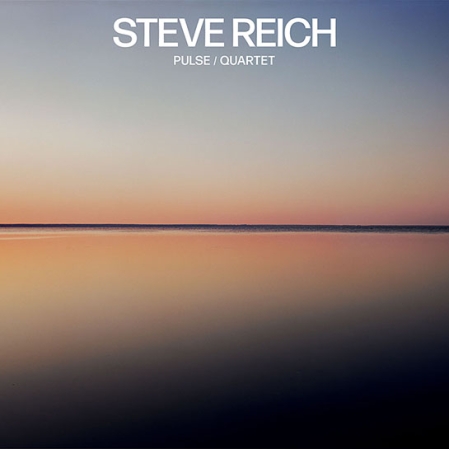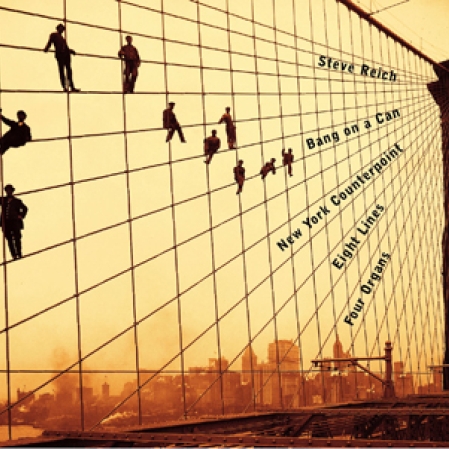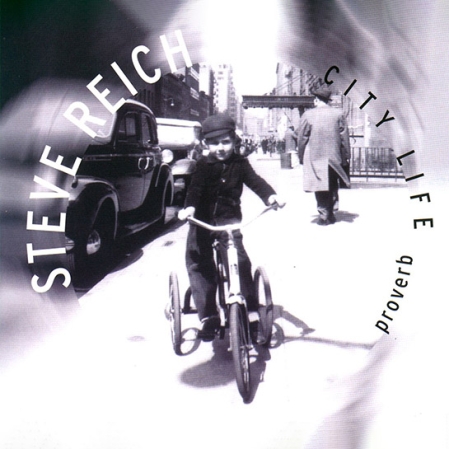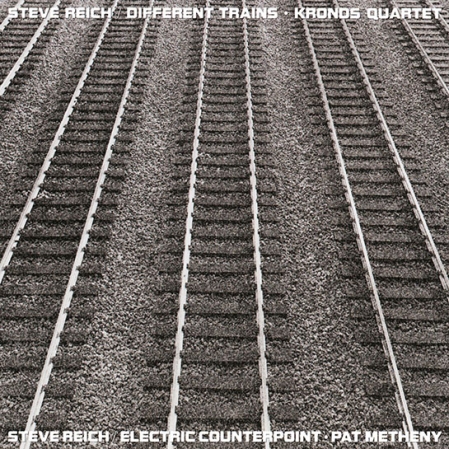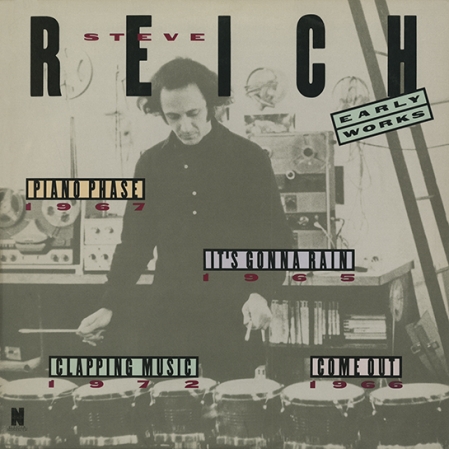This first recording of Steve Reich’s 2019 piece Reich/Richter is performed by Ensemble intercontemporain and conducted by George Jackson. The composition was originally written to be performed with Gerhard Richter and Corinna Belz’s film Moving Picture (946-3), for which Richter’s book Patterns served as source material. “Reich’s music ... expands from minimalist austerity to more full-bodied passages and back again,” says the Financial Times. “Reminiscent of his earliest work, it is very beautiful.”
Nonesuch Records released the first recording of Steve Reich’s Reich/Richter, performed by Ensemble intercontemporain and conducted by George Jackson, on June 10, 2022, with the vinyl out August 5. The composition was originally written to be performed with German visual artist Gerhard Richter and Corinna Belz’s film Moving Picture (946-3). Reich talks about the piece here:
Reich describes Richter’s book Patterns, which served as source material for the film: “It starts with one of his abstract paintings from the ’90s. He scanned a photo of the painting into a computer and then cut the scan in half and took each half, cut that in half and two of the four quarters he reversed into mirror images. He then repeated this process of ‘divide, mirror, repeat’ from half to quarter, eighth, sixteenth, thirty-second, all the way up to 4096th. The net effect is to go from an abstract painting to a series of gradually smaller anthropomorphic ‘creatures’ (since the mirroring produces bilateral symmetry) to still smaller ‘psychedelic’ abstractions to very fine stripes.
“Belz described the film in terms of ‘pixels’. The film begins with the two-'pixel' stripes, and the music starts with a two-sixteenth note oscillating pattern. When the film goes to four 'pixels,' the music moves onto a four-sixteenth note pattern, then to eight, and sixteen,” the composer continues. “After that, I began to think, ‘This is going to get ridiculous,’ so at that point I began introducing longer note values—initially eighth notes, and later as the pixel count grew in the film, to quarter notes. By the middle of the film, when the images move from 512 to 1064 pixels and the images become larger and more ‘creature’ like, the music really slows. Later, as the pixel count begins to diminish, the music moves back into more rapid eighths and then sixteenth, ending with the most intense rapid movement.”
Nonesuch has recorded every new piece of music by Steve Reich since 1985, beginning with The Desert Music and continuing through 2018’s Pulse/Quartet, resulting in twenty-two albums and the two box sets Phases in 2006 and Works: 1965-1995 in 1997. The label will put out a collection of his complete works in 2023.
Reich released a book in March 2021, Conversations, that includes dialogues with past collaborators, fellow composers, musicians, and visual artists who have been influenced by his work, including: David Lang, Brian Eno, Richard Serra, Michael Gordon, Michael Tilson Thomas, Russell Hartenberger, Robert Hurwitz, Stephen Sondheim, Jonny Greenwood, David Harrington, Elizabeth Lim-Dutton, David Robertson, Micaela Haslam, Anne Teresa de Keersmaeker, Julia Wolfe, Nico Muhly, Beryl Korot, Colin Currie, and Brad Lubman. Booklist said in its review, “Iconoclastic American composer Steve Reich is singular in his own right, and when he is in conversation with other equally iconoclastic composers, conductors, sculptors, musicians, percussionists, and video artists, sparks not only fly, they sparkle ... Reich and his colleagues conduct lovely give-and-takes during which they share stories, creative approaches, and viewpoints ... Reich's Conversations is the best kind of eavesdropping.”
Steve Reich has been called “America’s greatest living composer” (Village Voice), “the most original musical thinker of our time” (New Yorker), and “among the great composers of the century” (New York Times). His music has influenced composers and mainstream musicians all over the world. Music for 18 Musicians and Different Trains have earned him two Grammy Awards, and in 2009, his Double Sextet won the Pulitzer Prize. Reich’s documentary video opera works—The Cave and Three Tales, done in collaboration with video artist Beryl Korot—have been performed on four continents. His recent work Quartet, for percussionist Colin Currie, sold out two consecutive concerts at Queen Elizabeth Hall in London shortly after tens of thousands at the Glastonbury Festival heard Jonny Greenwood (of Radiohead) perform Electric Counterpoint followed by the London Sinfonietta performing his Music for 18 Musicians.
In 2012, Reich was awarded the Gold Medal in Music by the American Academy of Arts and Letters. He has additionally received the Praemium Imperiale in Tokyo, the Polar Music Prize in Stockholm, the BBVA Award in Madrid, and recently the Golden Lion at the Venice Biennale. He has been named Commandeur de l’Ordre des Arts et des Lettres and has been awarded honorary doctorates by the Royal College of Music in London, The Juilliard School, the Liszt Academy in Budapest, and the New England Conservatory of Music, among others. “There’s just a handful of living composers who can legitimately claim to have altered the direction of musical history and Steve Reich is one of them,” states the Guardian.
Pierre Boulez founded the Ensemble intercontemporain in 1976 with the support of Michel Guy (who was France’s Minister of Culture at the time) and the collaboration and Nicholas Snowman. The Ensemble’s thirty-one soloists share a passion for twentieth and twenty-first century music. Under the artistic direction of Matthias Pintscher, the musicians work in close collaboration with composers, exploring instrumental techniques and developing projects that interweave music, dance, theater, film, video and visual arts. In collaboration with IRCAM (Institut de Recherche et Coordination Acoustique/Musique), the Ensemble intercontemporain is also active in the field of synthetic sound generation. New pieces are commissioned and performed on a regular basis. Resident of the Cité de la musique—Philharmonie de Paris, the Ensemble performs and records in France and abroad, taking part in major festivals worldwide.
George Jackson, winner of the 2015 Aspen Conducting Prize, came to attention after stepping in at short notice with Orchestre de Paris, where he stepped in for Daniel Harding. Recent highlights include leading Ensemble intercontemporain at Festival Romaeuropa, the Rainy Days Festival in Luxembourg, and Festival D’Automne in Paris, as well as conducting the RTÉ National Symphony Orchestra, the orchestra of Opéra de Rouen and the world premiere of Tscho Theissing’s Genia with Theater an der Wien. His varied operatic experience includes performances at Opera North, Hamburg State Opera and Opera Holland Park, as well as conducting a new production of Hänsel und Gretel at Grange Park Opera.
PRODUCTION CREDITS
Recorded live in concert for France Musique on March 7th, 2020 at Philharmonie de Paris-Cité de la musique, Grande sale Pierre Boulez
Artistic Sound Director: Vincent Villetard
Production Sound Manager: Jean Claude Mullet
Sound Directors: Stéphane Foulon, Michel Gacic, Olivier Leroux, Laurent Césard
Mastered by Robert C. Ludwig at Gateway Mastering, Portland, ME
Commissioned by The Shed, NYC; The Los Angeles Philharmonic Association, Gustavo Dudamel, Music & Artistic Director, Cal Performances, University of California, Berkeley; Barbican Centre and Britten Sinfonia; Philharmonie de Paris, Oslo Philharmonic.
World Premiere: April 6th, 2019 at the Shed, New York, by Ensemble Signal, conducted by Brad Lubman.
Cover Image: Gerhard Richter © Gerhard Richter 2021
Performance photos: © Luc Hossepied for l’Ensemble intercontemporain
Design: Ben Tousley
MUSICIANS
Performed by Ensemble intercontemporain
Conductor: George Jackson
Flutes: Emmanuelle Ophèle, Sophie Cherrier
Oboes: Philippe Grauvogel, Didier Pateau
Clarinets: Martin Adámek, Jérôme Comte
Vibraphones: Benoît Maurin, Samuel Favre
Pianos: Hidéki Nagano, Géraldine Dutroncy
Violins: Diego Tosi, Jeanne-Marie Conquer
Viola: John Stulz
Cello: Éric-Maria Couturier








